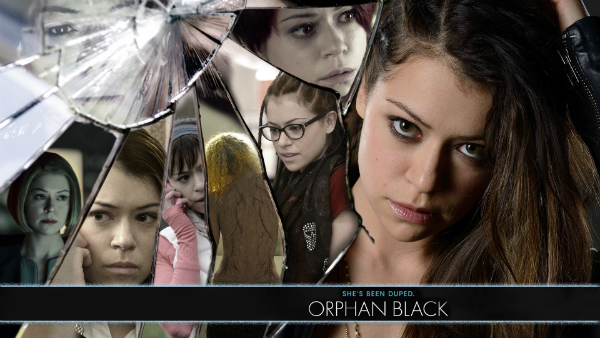Spoiler Alert
Canada’s compelling show Orphan Black will be airing its second season on BBC America this spring, and though Ms Misanthropia reviewed it on Bitch Flicks, I had to weigh in now that I’ve finally had a chance to finish watching the series! Orphan Black is gritty sci-fi with layered mysteries, mistaken (and impersonated) identity, and lots of complicated female characters. The most intriguing part of the show is that many of those multifaceted female characters are played by the same woman, Tatiana Maslany. She portrays all the clones involved in a seemingly nefarious scientific experiment.

At first, I was skeptical of Maslany’s acting abilities because there’s a lot of subtlety and nuance required to play at least nine characters with different upbringings, nationalities, socioeconomic backgrounds, and habits. Not only that, but the clones do a lot of impersonating each other. I was sold when I could tell one clone was impersonating another before the narrative announced it. Each clone’s mannerisms, body language, and even facial expressions are different. Damn. My hat’s off to Maslany who can make her smile different enough that I can tell which character she is without context.

In Orphan Black, the clones are often wildly different from one another, really hammering home the nature over nurture angle, which is an important representation of how women (and other marginalized groups) are affected by their environment. Orphan Black shows us women who thrive due to their environment (Cosima with her scientific brilliance), struggle because of it (grifter Sarah Manning), or become deviant and destructive as a result of it (religious serial killer Helena). There are tweaks made to each of their genetic code that explain away Katya’s respiratory disease, Cosima’s need for glasses as well as her gayness, and perhaps other anomalies among the clones yet to be introduced, but the message is clear that the DNA of these women is virtually identical making the entirety of their development environmentally-based.

I also want to take a second to talk about big brained science nerd Cosima, my favorite clone.

Maybe it’s because I, too, am a queer nerd girl, but Cosima’s aptitude for science and her lesbian sexuality are awesome. Where Sarah must use her body to get what she needs (like seducing Paul to distract him from realizing she’s not Beth Childs), Cosima uses her intellect. Cosima is the glue. Without her, the clones wouldn’t be able to do DNA testing or crawl down the rabbit hole of the scientific experimentation that created them. Not only that, but she is the one who discerns that each known clone has a “monitor” to observe and report back on clone activities. This means that Cosima is also capable of understanding and anticipating the psychological factors involved in genetic testing and cloning. It’s great to get to see the nerd girl shine and not be deemed sexless because of her brain power, as her affair with her monitor Delphine is the most engaging of the romances played out in the show.

Orphan Black showcases great female characters who are strong or interesting or smart or even infuriating, but they’re all unique and full of depth. The series also shows that the path of each clone’s development is dependent upon her environment, which is a huge statement about how oppression and opportunity are what shape us. In order for women to succeed, we must cultivate an environment that encourages achievement, and that means we’ve got to bust up gender norms.

Orphan Black exists on the strength of one actress’s ability to play multiple characters convincingly. Most importantly, it’s a show about a group of women: their lives, their families, their loves, their history, their interaction with each other, their deaths, and, most poignantly, their quest to solve the mystery of their existence. Good stuff, no? It’s getting harder and harder for the media to claim that people won’t watch stories about women, especially in the face of Orphan Black‘s gripping action, great story telling, and superb acting.
——————
Amanda Rodriguez is an environmental activist living in Asheville, North Carolina. She holds a BA from Antioch College in Yellow Springs, Ohio and an MFA in fiction writing from Queens University in Charlotte, NC. She writes all about food and drinking games on her blog Booze and Baking. Fun fact: while living in Kyoto, Japan, her house was attacked by monkeys.


Wanna watch!
Great article! Cosima is my favourite too